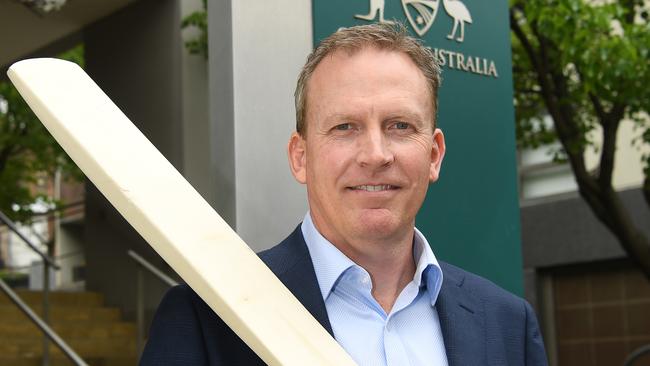Coronavirus: Cricket Australia warns game in peril, records significant stock losses
Cricket Australia, presumed to have missed the crippling economic impact of COVID-19, has recorded significant stock market losses.

Cricket Australia, an organisation presumed to have missed the crippling economic impact of Covid19 on winter sports, has recorded significant losses on the stock market.
The Australian can reveal that chief executive Kevin Roberts rang leading male and female players this week claiming the game was in a difficult financial situation on Tuesday.
The players were warned the game was in a perilous situation and facing difficult times ahead.
The chief executive is understood to have rung Tim Paine, Meg Lanning, Steve Smith, Pat Cummins, David Warner, Aaron Finch, Rachel Haynes and others in individual calls warning that there could be a crisis ahead if drastic action wasn’t taken.
The cricket boss has made an effort to be more inclusive following the bitter pay dispute that saw a split between players and Cricket Australia in 2017.
Cricket Australia told stunned staff members on Thursday that the vast majority would be stood down on 20 per cent pay until the end of the financial year. The employees will learn their fate today.
Coaches too are expected to feel the pinch with most expected to be stood down, but players are protected as their wages are calculated as a share of cricket revenue which hasn’t been affected.
Cricket was exposed to market fluctuations through its investment strategy, it’s 2019 annual report revealing $90m in local and overseas equity securities. The financial report claimed just $26.6m in cash reserves, down from $83.8 the previous financial year and almost $200m in 2016.
The dwindling reserves reflect the cyclical nature of cricket’s revenue cycles and is why the game works on a four year economic cycle.
The AFL has $184m in cash reserves and declared no stock market exposure.
Cricket would not confirm a figure for the market losses but The Australian understands cricket is claiming losses of $15m on its investments. There are claims the figure is higher.
Cricket was reported to be seeking a $200m line of credit, although there has been criticism of the move from within the game.
The calls and lay offs are a shock given the game’s biggest revenue streams have not been affected by the international crisis. Only a handful of games against New Zealand, a tour of Bangladesh and a women’s tour of New Zealand have been cancelled.
There is still hope that the summer’s major earners, the Indian Test tour and the BBL, can proceed, but even if they don’t the financial impact on cricket’s books would be felt down the track.
The ICC T20 World Cup is also in danger but is an ongoing expense to the host country.
If the summer series were cancelled the game would be in serious trouble although a number of contingency plans are in place if India cannot tour.
Cricket had been on a cost saving drive in recent years as it refocuses its operation to support more grass roots cricket.
The states have also been informed that they will have to make major cuts to operations, but have hit back saying there is no need to panic.
Staff were to be told on Friday who would be stood down for the rest of the year on significantly reduced pay with the organisation saying only a skeleton crew would survive.
All executive staff, including Roberts, have taken a voluntary 20% cut.
Cricket was hoping those stood down would qualify for government assistance, but that would not be guaranteed.
The organisation released a statement yesterday afternoon soon after staff were told of the impending cuts.
“Cricket Australia — like all sporting bodies — is planning for a return to training/play although no one is certain when this will be possible at this stage, and many scenarios are being considered,” a spokesperson said.
“We are conscious of the impact this will have on Australian Cricket and are working hard to manage that proactively.
“We have made the decision during this period of isolation, where activity has naturally been reduced, to stand down our people on reduced pay (with the exception of a skeleton staff) effective 27 April for the remainder of the financial year.
“We will continue to seek advice from medical experts and relevant government agencies to ensure the health and safety of our people, volunteers and communities, and to return to business as soon as possible.”






To join the conversation, please log in. Don't have an account? Register
Join the conversation, you are commenting as Logout